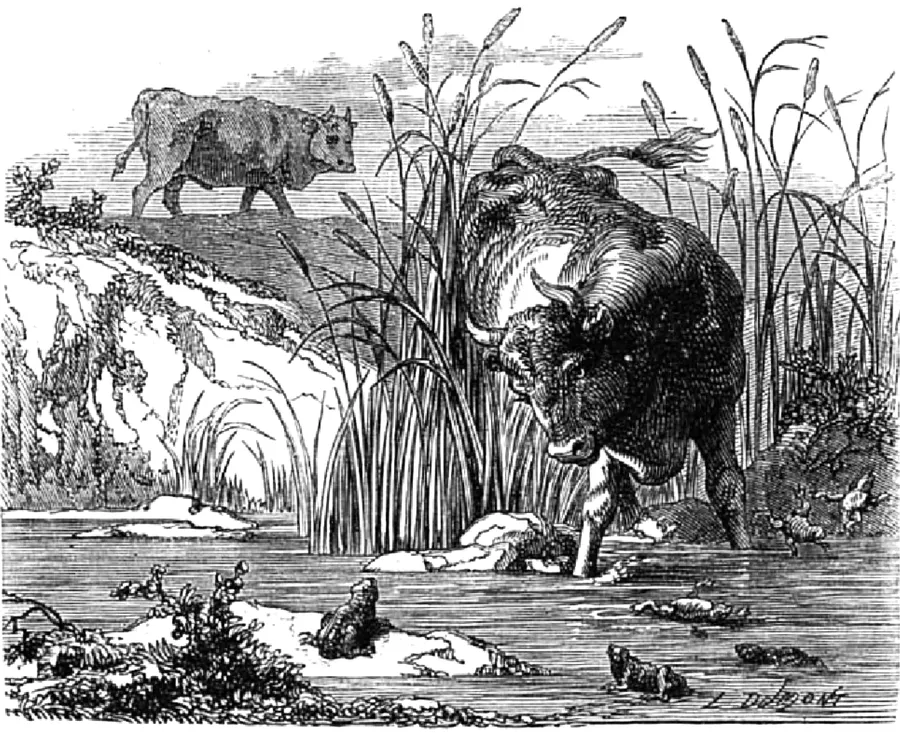The two Bulls and the Frog
The little ones are always suffering from the foolishness of the big ones.

Les deux Taureaux et la Grenouille
Deux taureaux combattaient à qui posséderait
Une génisse avec l’empire.
Une grenouille en soupirait.
Qu’avez-vous ? se mit à lui dire
Quelqu’un du peuple coassant.
Eh ! ne voyez-vous pas, dit-elle,
Que la fin de cette querelle
Sera l’exil de l’un ; que l’autre,
le chassant,
Le fera renoncer aux campagnes fleuries ?
Il ne régnera plus sur l’herbe des prairies,
Viendra dans nos marais régner sur les roseaux ;
Et, nous foulant aux pieds jusques
au fond des eaux,
Tantôt l’une, et puis l’autre,
il faudra qu’on pâtisse
Du combat qu’a causé madame la génisse.
Cette crainte était de bon sens.
L’un des taureaux en leur demeure
S’alla cacher, à leurs dépens :
Il en écrasait vingt par heure.
Hélas ! on voit que de tout temps
Les petits ont pâti
des sottises des grands.
The two Bulls and the Frog
Two bulls were fighting who would own
A heifer with the empire.
A frog sighed.
What do you have? began to tell him
Someone from the croaking people.
Hey! can't you see, he said,
That the end of this quarrel
Will be the exile of one; that the other,
chasing him,
Will make him give up the flowery countryside?
He will no longer reign over the prairie grass,
Shall come to our swamps reign over the reeds;
And, trampling us under his feet
to the bottom of the water,
Sometimes one, and then the other,
we will have to pass
Of the fight that the heifer has caused.
This fear was common sense.
One of the bulls in their home
Went to hide, at their expense:
He crushed twenty an hour.
Alas! we see that at all times
The little ones have suffered
from the foolishness of the big ones..
First Fable: The Circada and the Ant
Previous fable: The Oak and the Reed
Next fable: The Bat and the two Weasels
The Life of Aesop, by Jean de La Fontaine - part 7
Xantus, Aesop's master, for his part, saw how important it was to him not to free Aesop, and how much honor the possession of such a slave did him. Even one day, doing debauchery with his disciples, Aesop, who was serving them, saw that the fumes were already warming their brains, both in the master and in the students. Debauchery of wine, he told them, has three degrees: the first, of voluptuousness; the second, of drunkenness; the third, with fury. They laughed at his observation and continued to empty the pots. Xantus went so far as to lose his mind, and brag that he would drink the sea. This made the company laugh. Xantus backed up what he had said, wagered his house that he would drink the whole sea; and, to assure the wager, he put down the ring which he had on his finger.
The following day, when the vapors of Bacchus were dissipated, Xantus was extremely surprised not to find his ring, which he held very dear. Aesop told him that it was lost and that his house was also lost by the wager he had made. Behold the philosopher greatly alarmed: he begged Aesop to teach him how to win the wager. Aesop thought of this one.
When the day fixed for the execution of the wager arrived, all the people of Samos hastened to the shore of the sea to witness the shame of the philosopher. The disciple who had pledged against him was already triumphing. Xantus said to the assembly: Gentlemen, I have truly wagered that I should drink the whole sea, but not the rivers which enter it; wherefore, let him that hath pledged against me divert their courses, and then I will do what I boasted of doing. Everyone admired the expedient that Xantus had found to get out of such a bad situation. The disciple confessed that he was defeated, and asked forgiveness from his master. Xantus was escorted back to his lodgings with acclamation.